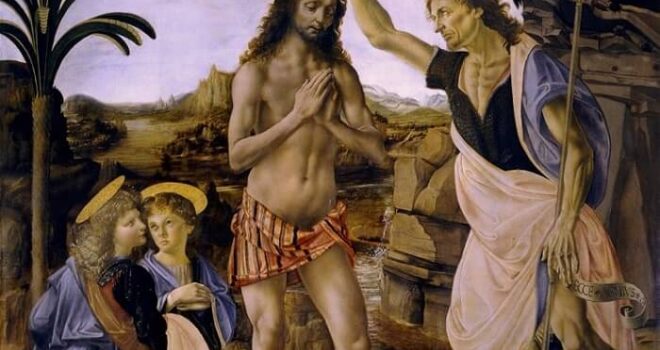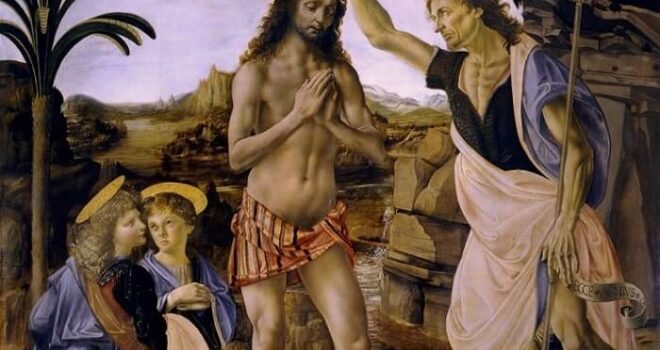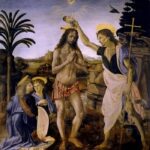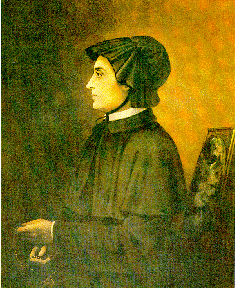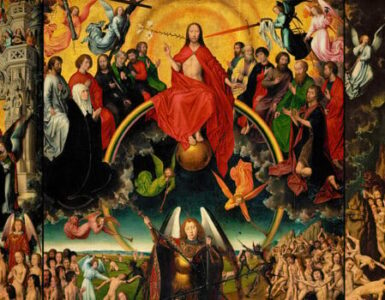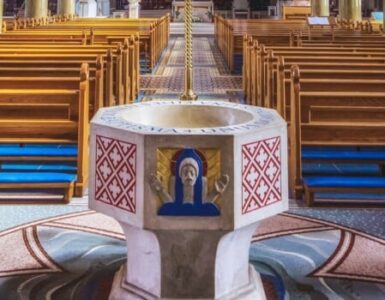Jesus walked towards the Jordan River with a longing in His Heart to be baptized. But why did Jesus need to be baptized? Is He not God? Yes, surely He is, but Jesus chose to sanctify the waters of Baptism—all the waters to be used for Baptism until the end of time—by His own Baptism by John. Stepping into the Jordan River and being baptized by John, Jesus sanctifies all the waters of Baptism. John objects and says it is I who should be baptized by You, but Jesus insists, let it be so. John did not understand it seems why Jesus wanted to be baptized by him but he obeyed the Lord, perhaps not realizing that he was participating by God’s will in an immense work of grace. The waters of Baptism would henceforth sanctify souls until the end of time.
Do we really know what goes on at Baptism? Are we aware of the graces we received by our Baptism? Baptism opens for us the gates of Heaven, which were closed by the original sin of Adam and Eve, our first parents. We inherited the sin of Adam and Eve—original sin—we their children. Baptism takes away original sin from us and enables us to enter Heaven, to enter the place in Heaven God prepared for us from all eternity. However the effects of original sin remain in us; Baptism does not remove these. These effects are evil tendencies in the soul that we need to fight against until our death, which incline us to the seven Capital Sins: pride, avarice, lust, gluttony, anger, envy and sloth.
At Baptism we receive seven virtues which help us to fight against these evil tendencies:
The three Theological Virtues: faith, hope, love
The four Moral Virtues: prudence, justice, fortitude, and temperance
These virtues need to be practiced faithfully throughout our lives to oppose the evil tendencies towards the 7 Capital Sins. Failing to practice the virtues would render them inactive in our souls. By practicing them daily, and even perhaps moment by moment for the love of God, we form good habits, spiritual muscles as it were, which fight against the tendency to sin.
These virtues which we received at Baptism, 7 in total, are perfected by the 7 Gifts of the Holy Spirit which we also receive at Baptism. These are: Wisdom, Knowledge, Understanding, Counsel, Fortitude, Piety and the Fear of the Lord. But in order for the Gifts we received to perfect the virtues, as Don Dolindo Ruotolo says, we need to practice the virtues.
At Baptism we received a grace which we should thank God for on our knees for the rest of our lives, and it is this: the Most Holy Trinity—Father, Son and Holy Spirit—came to live or dwell in our souls. This is an almost incomprehensible grace to our poor, limited understanding. Heaven is God’s dwelling place and God comes to dwell in my soul. Thus did St. Elizabeth of the Trinity say, “it seems to me that I have found my Heaven on earth since Heaven is God and God is in my soul.” For this reason St. Paul says in Scripture that we are temples of the Holy Spirit.
The word “temple” signifies the “House of God,” the place where God dwells on earth. Today we use the word “church.” The church is God’s dwelling place on earth, His House. More specifically, in Roman Catholic Churches, God dwells in a little “house” as it were within the great house the church, a little “house” which is called the tabernacle. There in the tabernacle are Hosts which are consecrated during the Holy Sacrifice of the Mass. These Hosts consecrated by the priest at Mass are no longer bread, but the Body, Blood, Soul and Divinity of Our Lord Jesus Christ. They have become God under the appearance of bread, by the words of Jesus Christ pronounced by the priest at Mass—“this is My Body…this is My Blood.” These are the words of Jesus Himself at the Last Supper when He took the bread, broke it and said: “This is my body which is given for you.” (Luke 22:19)
Jesus the Eternal High Priest ordains His Apostles the first priests of the New Covenant with the words, “Do this in remembrance of me.” Luke 22:19) As Pope Saint John Paull II says, the word “remembrance” in Scripture means making present. Thus henceforth, the priests of the New Covenant make present, at the Holy Sacrifice of the Mass, with Jesus’ own words “this is My Body…this is My Blood,” the one sacrifice of Jesus on the Cross on the altars of the world until the end of time. By making Jesus present on the altars at Mass with His own words “this is My Body…this is My Blood” they make present the Sacrifice He made of Himself once and for all on Calvary. This Sacrifice of Himself on the Cross at Calvary is not a historical event which took place two thousand years ago. What happens to God, and Jesus is God, remains present for all eternity because God is the eternal present. His acts are theandric—they are acts of God, thus they remain eternally present in Him and He in them. The Mysteries of His life remain ever present in Him and He in them in the Most Blessed Sacrament of the Altar, the Eucharist. Thus at the Holy Sacrifice of the Mass, Jesus is present on the altar in His crucifixion, in His death, in His Resurrection. The entire Paschal Mystery which is the Passion, Death and Resurrection of Jesus, is present before our eyes on the altar in the Most Blessed Sacrament, the Eucharist. Faith does not see, but faith believes. And why? Because Jesus said so. Take eat, this is My Body, Take drink, this is My Blood.
Image: the Baptism of Christ, Leonardo Davinci


